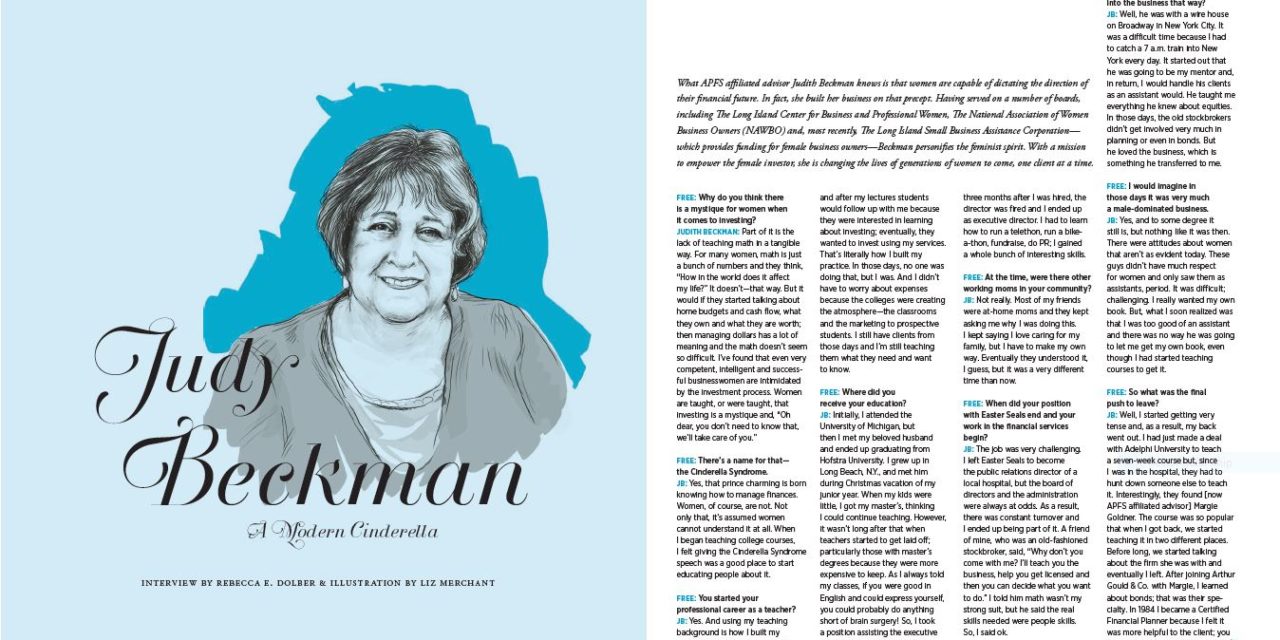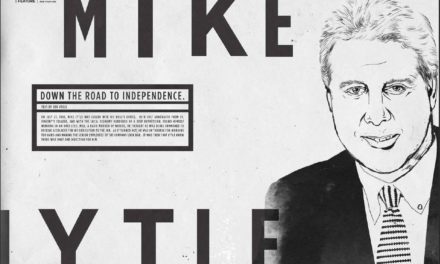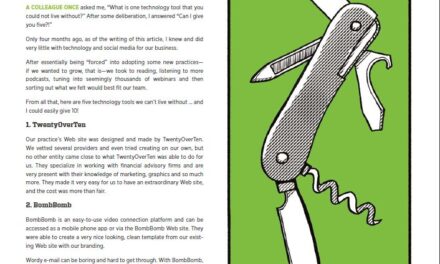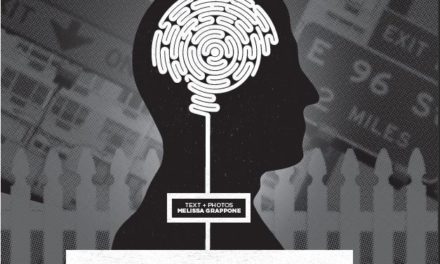
FREE 8.1 Q&A – Judy Beckman
What APFS affiliated advisor Judith Beckman knows is that women are capable of dictating the direction of their financial future. In fact, she built her business on that precept. Having served on a number of boards, including The Long Island Center for Business and Professional Women, The National Association of Women Business Owners (NAWBO) and, most recently, The Long Island Small Business Assistance Corporation— which provides funding for female business owners—Beckman personifies the feminist spirit. With a mission to empower the female investor, she is changing the lives of generations of women to come, one client at a time.
To view the full article please register below:
FREE 8.1 Q&A – Judy Beckman
A modern Cinderella.
What APFS affiliated advisor Judith Beckman knows is that women are capable of dictating the direction of their financial future. In fact, she built her business on that precept. Having served on a number of boards, including The Long Island Center for Business and Professional Women, The National Association of Women Business Owners (NAWBO) and, most recently, The Long Island Small Business Assistance Corporation— which provides funding for female business owners—Beckman personifies the feminist spirit. With a mission to empower the female investor, she is changing the lives of generations of women to come, one client at a time.
FREE: Why do you think there is a mystique for women when it comes to investing?
JUDITH BECKMAN: Part of it is the lack of teaching math in a tangible way. For many women, math is just a bunch of numbers and they think, “How in the world does it affect my life?” It doesn’t—that way. But it would if they started talking about home budgets and cash flow, what they own and what they are worth; then managing dollars has a lot of meaning and the math doesn’t seem so difficult. I’ve found that even very competent, intelligent and successful businesswomen are intimidated by the investment process. Women are taught, or were taught, that investing is a mystique and, “Oh dear, you don’t need to know that, we’ll take care of you.”
FREE: There’s a name for that—the Cinderella Syndrome.
JB: Yes, that prince charming is born knowing how to manage finances. Women, of course, are not. Not only that, it’s assumed women cannot understand it at all. When I began teaching college courses, I felt giving the Cinderella Syndrome speech was a good place to start educating people about it.
FREE: You started your professional career as a teacher?
JB: Yes. And using my teaching background is how I built my business. I would give seminars and after my lectures students would follow up with me because they were interested in learning about investing; eventually, they wanted to invest using my services. That’s literally how I built my practice. In those days, no one was doing that, but I was. And I didn’t have to worry about expenses because the colleges were creating the atmosphere—the classrooms and the marketing to prospective students. I still have clients from those days and I’m still teaching them what they need and want to know.
FREE: Where did you receive your education?
JB: Initially, I attended the University of Michigan, but then I met my beloved husband and ended up graduating from Hofstra University. I grew up in Long Beach, N.Y., and met him during Christmas vacation of my junior year. When my kids were little, I got my master’s, thinking I could continue teaching. However, it wasn’t long after that when teachers started to get laid off; particularly those with master’s degrees because they were more expensive to keep. As I always told my classes, if you were good in English and could express yourself, you could probably do anything short of brain surgery! So, I took a position assisting the executive director of Easter Seals. However, three months after I was hired, the director was fired and I ended up as executive director. I had to learn how to run a telethon, run a bikea-thon, fundraise, do PR; I gained a whole bunch of interesting skills.
FREE: At the time, were there other working moms in your community?
JB: Not really. Most of my friends were at-home moms and they kept asking me why I was doing this. I kept saying I love caring for my family, but I have to make my own way. Eventually they understood it, I guess, but it was a very different time than now.
FREE: When did your position with Easter Seals end and your work in the financial services begin?
JB: The job was very challenging. I left Easter Seals to become the public relations director of a local hospital, but the board of directors and the administration were always at odds. As a result, there was constant turnover and I ended up being part of it. A friend of mine, who was an old-fashioned stockbroker, said, “Why don’t you come with me? I’ll teach you the business, help you get licensed and then you can decide what you want to do.” I told him math wasn’t my strong suit, but he said the real skills needed were people skills. So, I said ok.
FREE: What was it like breaking into the business that way?
JB: Well, he was with a wire house on Broadway in New York City. It was a difficult time because I had to catch a 7 a.m. train into New York every day. It started out that he was going to be my mentor and, in return, I would handle his clients as an assistant would. He taught me everything he knew about equities. In those days, the old stockbrokers didn’t get involved very much in planning or even in bonds. But he loved the business, which is something he transferred to me.
FREE: I would imagine in those days it was very much a male-dominated business.
JB: Yes, and to some degree it still is, but nothing like it was then. There were attitudes about women that aren’t as evident today. These guys didn’t have much respect for women and only saw them as assistants, period. It was difficult; challenging. I really wanted my own book. But, what I soon realized was that I was too good of an assistant and there was no way he was going to let me get my own book, even though I had started teaching courses to get it.
FREE: So what was the final push to leave?
JB: Well, I started getting very tense and, as a result, my back went out. I had just made a deal with Adelphi University to teach a seven-week course but, since I was in the hospital, they had to hunt down someone else to teach it. Interestingly, they found [now APFS affiliated advisor] Margie Goldner. The course was so popular that when I got back, we started teaching it in two different places. Before long, we started talking about the firm she was with and eventually I left. After joining Arthur Gould & Co. with Margie, I learned about bonds; that was their specialty. In 1984 I became a Certified Financial Planner because I felt it was more helpful to the client; you need a full, comprehensive picture of someone’s finances, and stocks and bonds weren’t the only way to do it. With my CFP, plus the series 7 and my knowledge of bonds and equities, I was giving lectures all over the place and building my practice.
FREE: Interestingly, you are still working in an office with Margie! Who came to AP first?
JB: Well, Margie eventually left Arthur Gould to join another firm. Initially, I stayed but when Arthur decided to retire, I transferred to Margie’s firm, Seco West. In 2002, Seco West merged with American Portfolios, and that’s how I got to AP. Brad Goldner, Margie’s son, is the branch manager at our location. I’ve known Brad since he came into the business. He and I are like a team. We interrelate all the time in terms of products or client solutions. It’s really like a family here. I also have my assistant, Abbe Bertucci. She has her Series 7 and acts on my behalf working on projects and handling clients. She’s a problem solver, and so capable; she is extremely valuable to me.
FREE: Tell us a little bit about your clients.
JB: When I was building my practice, I knew the women’s business market was a large group that wasn’t being targeted. I also knew that women work with people they know and trust. It was really important to me that women understand that they are as capable as anybody to understand finances, investing and how to put money away for retirement, particularly since they live longer and will need the money longer; they can’t just rely on the so-called inborn knowledge that their husband, boyfriend, son or prince on a white horse might be born with. When building my practice, it was part of my crusade to give women the confidence that they could handle it. The handling of money is very psychologically intense and, depending on what your attitude is, it can change what your behavior is, and sometimes you can change that behavior if you change the attitude. So, along with that thrust to women in general, I have a lot of women clients who are widows; these are women who for many years never had to handle money at all and then all of a sudden this monumental event occurs and they’re left having to manage. So those women are a particular specialty of mine. Along with them are other single women, business owners, men, families, nonprofits … it’s a mixed bag.
FREE: How about your product mix?
JB: Investments differ in terms of the client’s financial situation. I initially started on the transactional side, but also created portfolios of stocks and bonds because I had those skill sets. I’m still doing it for some clients, but with others I’m utilizing the skills of third-party money managers.
FREE: Why do you choose to utilize third-party mangers at this point, as opposed to doing it yourself?
JB: After doing the due diligence, I find the ones that I choose are excellent. They are so good at what they do—why would I try to mimic that? Creating a portfolio is extremely labor intensive. It’s an enormous amount of time and work and you have to be on. I mean, I’m used to juggling; I’ve juggled my whole life, but to do self-directed fee-based planning, the marketing and then servicing, too? It’s too much.
FREE: Speaking of marketing, how are you continuing to grow your practice?
JB: I have multiple sources, but at this point it’s mostly referrals.
FREE: Do you market differently to women than you do to men?
JB: My approach is similar because I find the knight in shining armor doesn’t know much more than Cinderella. I have found that women need more nurturing because they aren’t as confident about their ability to handle the money, initially. Men don’t really show you that. However, I make them all promise that they’ll stop me if they don’t understand something. I believe that you can’t make an informed decision if you don’t understand your choices. But, it’s not such a different approach.
FREE: How about your experience as a female advisor? Do you think it’s been much different from your male colleagues?
JB: A client of mine who’s a very interesting man once said to me the reason he came to me is because any woman who could make it in this field would probably have to be twice as good as the men in the field, and why would he go to anyone less than that? He’s been my client for more than 20 years. Being a woman, you have to prove yourself all the time; but I think if you care about what you do, care about people and you work hard, it all comes to fruition. I don’t know that it’s harder, but men are accepted sooner, even by clients. I figure if you work hard enough, you get accepted. If you show that you know what you are doing and that you care about the people you’re working with, gender doesn’t come into play.
FREE: With that said, there are still fewer women in the financial services industry than men.
JB: Yes. I expected to see more women in the field and I’m always disappointed about that, but that’s a different issue. It’s a hard field and what I’ve noticed is that the women who have stayed in the field are all successful; there’s really no middle ground.
FREE: What’s the best advice anyone’s given you?
JB: Believe in yourself and in your skills because you can do what you set your mind to. My father felt it was very important for a woman to be independent because you never know what’s going to happen in life. You may be dependent on a man initially, but things may not work out and you’ll have to make your way. He was very progressive because in those days, people didn’t worry about women making their way in the world; it was simply a matter of getting married. Period. That was one’s life goal. When I think about it, he was really very much ahead of his time.
FREE: What do you think the future holds for you?
JB: I think I’ll be doing what I’m doing now, but perhaps with some more time off for travel. One of my clients had a stepmother who was also an advisor; she was 88 when she retired and she died when she was 90. I see Warren Buffet at 83, he’s not stopping. Redstone from Viacom is even older than that. There’s a lot more to work than just the money. It is so stimulating and satisfying when you see how you help people reach their goals. I see some people who are retired and their brains sort of turn to mush. I never want a mushy brain—and with this job, certainly, there’s no way that can happen. Ever












